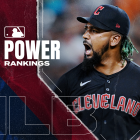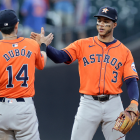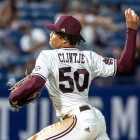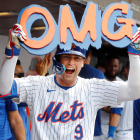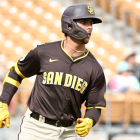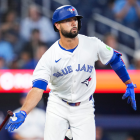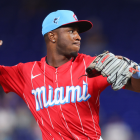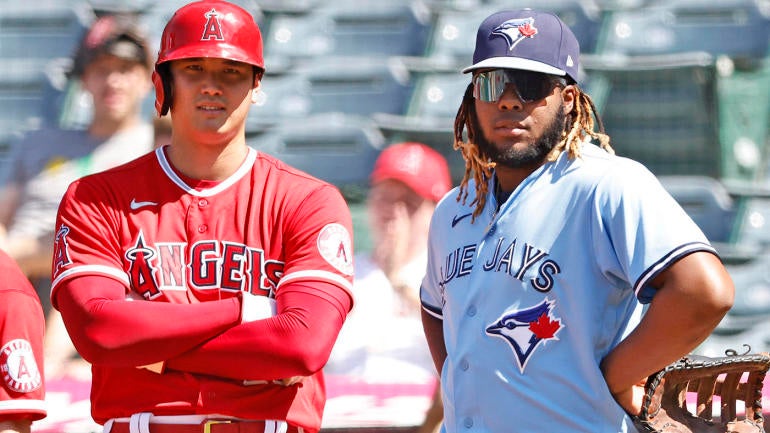
We now just a few weeks until the 2021 MLB playoffs begin. There's still plenty of jockeying to be done in the standings and we track that on a daily basis with the playoff picture.
We've been running a weekly MVP watch and we're set to do that again, but this time let's stray a little from my traditional format.
Usually I talk about how my assessment isn't going to be necessarily how I would vote right now, but instead where I believe the vote would fall if it happened right now, based upon years of studying BBWAA voting tendencies and tracking heavily late in each season for the past decade-plus.
When I look at the AL side right now, I believe it is pretty much over. Shohei Ohtani is rightfully going to win the MVP because he's having a once-in-a-lifetime season. He's one of the best hitters in the league while also having stolen 23 bases and put together an All-Star-caliber season on the mound. To be able to put this all together flies in the face of what baseball has been for a century.
This means Vladimir Guerrero, Jr. is set to finish second and his offensive season might be one of the best ever to not win MVP, so long as we compare him to his peers. That is, check out where he ranks in these categories.
- Hits: 1st
- Runs: 1st
- Home runs: 1st
- RBI: 3rd
- Total bases: 1st
- Batting average: 1st
- On-base percentage: 1st
- Slugging percentage: 1st
- OPS: 1st
- OPS+: 1st
- Walks: 3rd
- Times on base: 1st
- Extra-base hits: 4th
Holy smokes, right? He's dominating rate and counting stats.
Perhaps the easiest way to sort this out would be to find a list of the players to lead their league in the triple-slash (AVG/OBP/SLG) and work from there. That is the best way to tell how good an all-around hitter is. The best hitters hit for average, get on base at a high clip and hit for power. It's all right there in those three rate stats.
We'll go in reverse chronological order, as that's how I'm manually looking all this up. And remember, I'm only looking up players who led their league in all three slash stats and did not win MVP (using only years there was MVP voting).
2019 Christian Yelich (Milwaukee Brewers): There's a bit of a caveat here, because Yelich might've won the award if not for a broken kneecap in September. He ended up second and had absurd stats, but with only 130 games, he ended outside the top 10 in hits, runs and RBI while finishing fourth in home runs and seventh in total bases.
2000 Todd Helton (Colorado Rockies): How about these pre-humidor Coors numbers? Helton hit .372/.463/.698, leading the league in hits, doubles, RBI, times on base, total bases and WAR. He was second in runs, seventh in home runs and third in OPS+. He still only managed fifth in MVP voting. There's an argument this season was better than the one Vlad is currently putting together, but there's the Coors factor and, take note, Vlad, Jr. has a better OPS+ (which adjusts for ballpark conditions). Speaking of pre-humidor Coors ...
1999 Larry Walker (Colorado Rockies): The Hall of Famer hit .379/.458/.710, yet only finished 10th in MVP voting, thanks in part to only playing in 127 games. That means injury kept him outside the top 10 on pretty much every counting stat (he was exactly 10th in home runs and RBI).
1979 Fred Lynn (Boston Red Sox): A "Hall of the Very Good" player from the '70s and '80s, Mr. Lynn paced the AL in the triple-slash, OPS and OPS+ (176) and WAR among position players. He was fourth in runs, third in total bases, third in doubles, second in home runs, fourth in RBI, third in extra-base hits and fourth in times on base. He ended up finishing fourth in AL MVP voting. They used different stats back then to determine the winner, but in hindsight he was sure robbed.
1957 Ted Williams (Boston Red Sox): Get ready for a lot of Teddy Ballgame. First up, 1957, when he finished second in MVP voting to a historically-great Mickey Mantle. Mantle 11.3 WAR was one of the greatest in history by a position player (tied for 14th). Williams was fifth in runs, ninth in hits, seventh in doubles, second in home runs, ninth in RBI and third in total bases. Despite Williams sweeping the triple-slash, this was a perfectly defensible vote.
1948 Ted Williams (Boston Red Sox): Another one that WAR says the voters got right. Lou Boudreau topped Joe DiMaggio and Williams. Despite the lead in the triple-slashes and OPS+, Williams was second in WAR, third in runs, fifth in hits, sixth in homers, third in RBI and third in total bases. He did lead in doubles, but he's not all over first place like Vlad Jr. in 2021.
1947 Ted Williams (Boston Red Sox): The Yankees beat the Red Sox for the AL pennant by 14 games and I guess that was what happened here, because other Williams blew DiMaggio away. Williams had 28 more points in average, 108 more on-base percentage, 112 more in slugging (yes, that means over 200 more in OPS) while topping DiMaggio by 13 hits, 28 runs, 12 homers and 17 RBI. Williams led the league in all the rate stats, runs, total bases, homers and RBI. He was third in hits and second in doubles.
Oh and Williams more than doubled DiMaggio's WAR. I put it last because they didn't have it then. Look at them side by side if you want.
1942 Ted Williams (Boston Red Sox): This one is also terrible, in looking at the numbers side by side. Joe Gordon was a superior defender who had a great offensive season -- of course, he also led the league in strikeouts and double plays -- but I guess his team being nine games better meant he was more valuable than Williams. Teddy led the league in WAR, the rate stats by a mile (he had a 1.147 OPS and .930 was second place), runs, total bases, home runs, RBI, walks, extra-base hits, times on base, was third in hits and seventh in doubles.
1941 Ted Williams (Boston Red Sox): Yep, yet another runner-up finish for Williams. We can chalk this one up to DiMaggio's 56-game hitting streak, but it still looks outrageous to see that a player hit .406/.553/.735 and didn't win MVP. Williams led in WAR, runs, homers and times on base, but DiMaggio led in total bases, RBI and extra-base hits. Williams' 235 OPS+ dwarfs DiMaggio's 185 and is one of the best marks in MLB history. At least DiMaggio had an all-time season, too, this time around.
1935 Arky Vaughan (Pittsburgh Pirates): The Hall of Fame Pirates third baseman never won MVP, but he had a hell of an effort here, slashing .385/.491/.607 (190 OPS+). He's also not really a contender in this discussion. He was eighth in runs, 10th in hits, seventh in total bases, 10th in doubles, 10th in triples, eighth in home runs and sixth in RBI.
1934 Lou Gehrig (New York Yankees): The Iron Horse led the AL -- in addition to the triple-slash rate stats like everyone else on this list -- in WAR, total bases, home runs and RBI. He was third in runs, second in hits, ninth in doubles, second in walks and first in OPS+. He hit .363/.465/.706. He finished fifth in AL MVP voting.
1933 Chuck Klein (Philadelphia Phillies): The MVP runner up to a Hall of Fame pitcher with a stupid-good season (Carl Hubbell had a 1.62 ERA and 0.98 WHIP in 308 2/3 innings). Given that this was pre-Cy Young days, it makes sense. Klein led in position-player WAR, hits, doubles, home runs, RBI, total bases and was second in runs.
NOTE: We didn't go back further than 1930 because prior to that, a player could only win the MVP once and was ineligible after that one win. Just for fun, check out Babe Ruth's 1927 season and make terms with him getting zero MVP votes.
In a cursory glance here, it appears Vladdy is dealing with some Ted Williams seasons, perhaps a vintage Gehrig and probably Klein's 1933 for the best offensive performance from a non-MVP winner in modern MVP history.
As for the NL side of things, we'll do a deeper dive on that league next week. For now, it looks like it's still Fernando Tatis, Jr. with Max Muncy and Bryce Harper right there while Trea Turner and Freddie Freeman are in the mix. That will be our main focus here next week.










